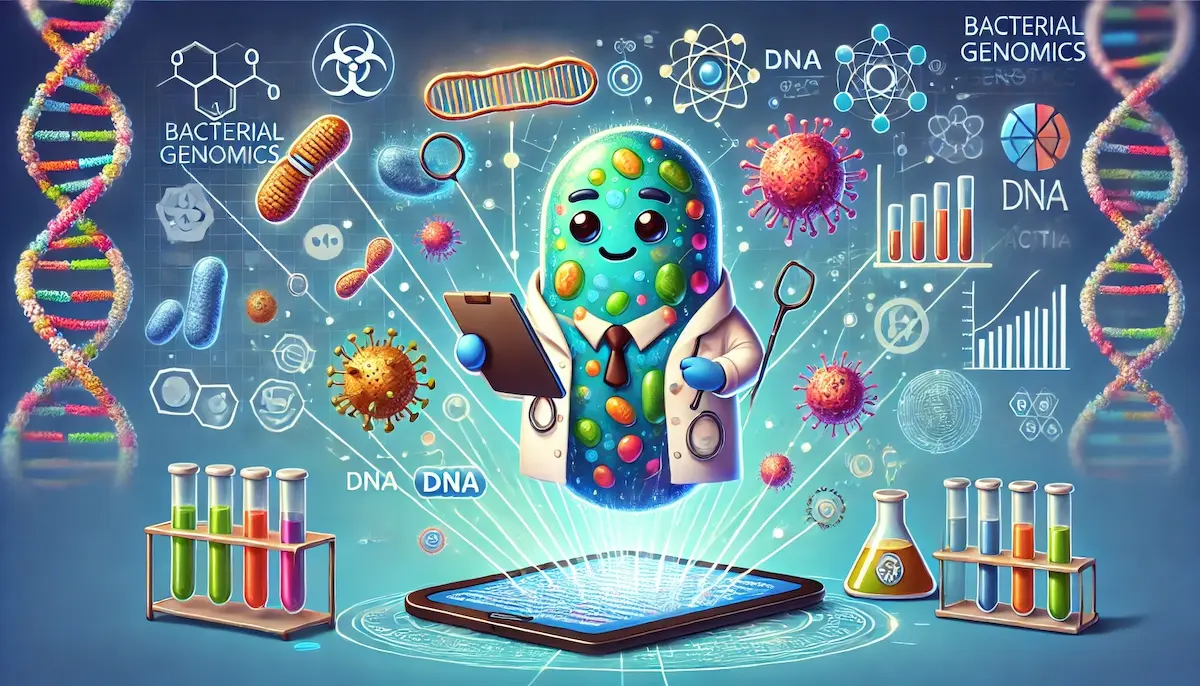Bacterial genomics is the study of the genetic material of bacteria, focusing on understanding the structure, function, and evolution of bacterial genomes. This field provides crucial insights into how bacteria live, adapt, and interact with their environments, including their roles in health, disease, and biotechnology. Bacterial genomics is vital for advancing medicine, agriculture, and environmental science, enabling innovations such as the development of new antibiotics, probiotics, and bioengineered organisms.
The Evolution of Bacterial Genomics
The field of bacterial genomics began with the sequencing of the first bacterial genome, Haemophilus influenzae, in 1995. This groundbreaking achievement marked the beginning of a new era in microbiology, where the complete genetic blueprint of bacteria could be studied in detail. Since then, rapid advancements in DNA sequencing technologies, particularly next-generation sequencing (NGS), have made it possible to sequence thousands of bacterial genomes, providing an unprecedented understanding of bacterial diversity and function.
Bacterial genomics has grown to include not only the sequencing and analysis of individual bacterial genomes but also the study of bacterial populations and communities, giving rise to fields such as metagenomics and comparative genomics.
Key Areas of Bacterial Genomics
Genome Sequencing and Annotation
Genome sequencing is the process of determining the complete DNA sequence of a bacterial genome. This sequence provides a comprehensive view of the genetic information encoded within the bacterium, including genes that determine its metabolism, pathogenicity, and resistance to antibiotics. Once the genome is sequenced, it is annotated to identify the locations and functions of genes, regulatory elements, and other genomic features.
Comparative Genomics
Comparative genomics involves comparing the genomes of different bacterial species or strains to identify similarities and differences. This approach helps scientists understand the evolutionary relationships between bacteria, as well as the genetic basis for specific traits such as antibiotic resistance or virulence. Comparative genomics is also used to identify conserved genes that are essential for bacterial survival, which can be targeted in the development of new antibiotics.
Metagenomics
Metagenomics is the study of genetic material recovered directly from environmental samples, such as soil, water, or the human gut, without the need for culturing bacteria in the lab. This approach allows researchers to study the diversity and functions of bacterial communities in their natural environments, providing insights into how these communities contribute to ecosystem processes, human health, and disease.
Functional Genomics
Functional genomics focuses on understanding how bacterial genes are expressed and how they contribute to the bacterium’s phenotype (observable characteristics). Techniques such as RNA sequencing, proteomics, and metabolomics are used to study gene expression, protein interactions, and metabolic pathways. Functional genomics helps researchers understand how bacteria respond to environmental changes, interact with other organisms, and cause diseases.
The Impact of Bacterial Genomics
Bacterial genomics has profound implications for medicine, agriculture, environmental science, and biotechnology.
Medicine
In medicine, bacterial genomics is crucial for understanding infectious diseases and developing new treatments. By analyzing the genomes of pathogenic bacteria, scientists can identify genes responsible for virulence, drug resistance, and transmission. This knowledge is essential for developing targeted antibiotics, vaccines, and diagnostic tools. For example, genomics has been instrumental in tracking and controlling outbreaks of antibiotic-resistant bacteria, such as MRSA (Methicillin-resistant Staphylococcus aureus).
Agriculture
Bacterial genomics plays a key role in agriculture by helping to improve crop yields and soil health. Beneficial bacteria, such as those involved in nitrogen fixation or plant growth promotion, can be identified and harnessed to develop biofertilizers and biopesticides. Additionally, genomics helps in managing bacterial plant pathogens by identifying genes associated with disease and developing resistant crop varieties.
Environmental Science
In environmental science, bacterial genomics is used to study the roles of bacteria in processes such as nutrient cycling, bioremediation, and carbon sequestration. By understanding the genomic basis of these processes, scientists can develop strategies to enhance beneficial microbial activities, such as using bacteria to clean up oil spills or reduce greenhouse gas emissions.
Biotechnology
Bacterial genomics is a cornerstone of biotechnology, enabling the engineering of bacteria to produce valuable products such as biofuels, pharmaceuticals, and industrial enzymes. By manipulating bacterial genomes, scientists can create strains that are optimized for specific tasks, such as producing insulin or breaking down plastic waste. Genomics also aids in the discovery of new bacterial enzymes that can be used in various industrial processes.
Challenges and Future Directions
Despite the significant advances, bacterial genomics faces challenges such as the complexity of bacterial genomes, which can include plasmids (extra-chromosomal DNA), horizontal gene transfer, and high levels of genetic diversity within species. Additionally, the vast amount of genomic data generated by modern sequencing technologies requires advanced bioinformatics tools and expertise for analysis and interpretation.
Looking ahead, the integration of artificial intelligence (AI) and machine learning with bacterial genomics holds promise for accelerating the discovery of new antibiotics, understanding bacterial evolution, and developing innovative biotechnological applications. AI can help analyze large genomic datasets, predict gene functions, and identify novel targets for drug development.
Bacterial genomics is an essential field that continues to drive progress in science and technology, offering solutions to some of the world’s most pressing challenges in health, agriculture, and the environment.
Blockfine thanks you for reading and hopes you found this article helpful.
